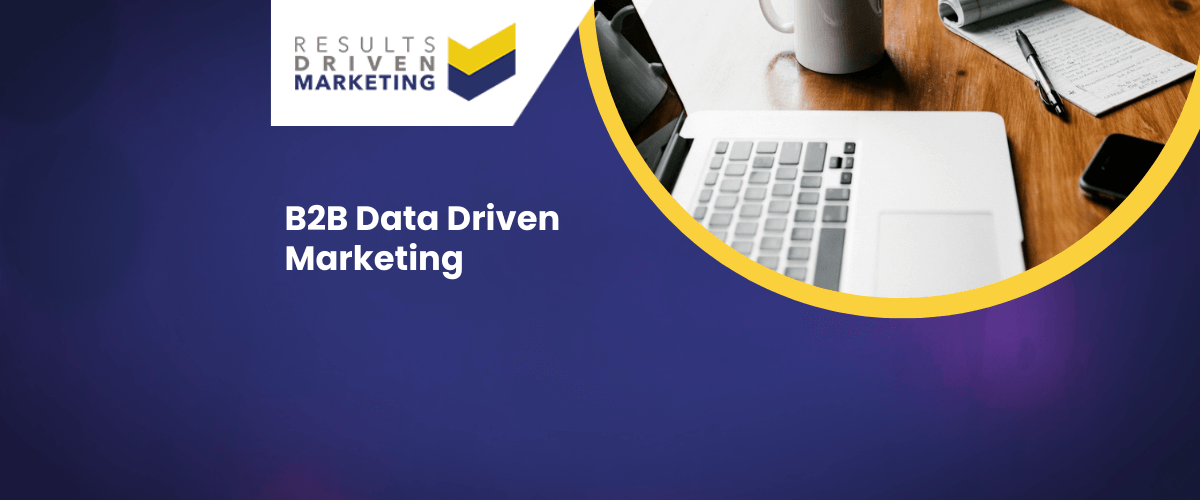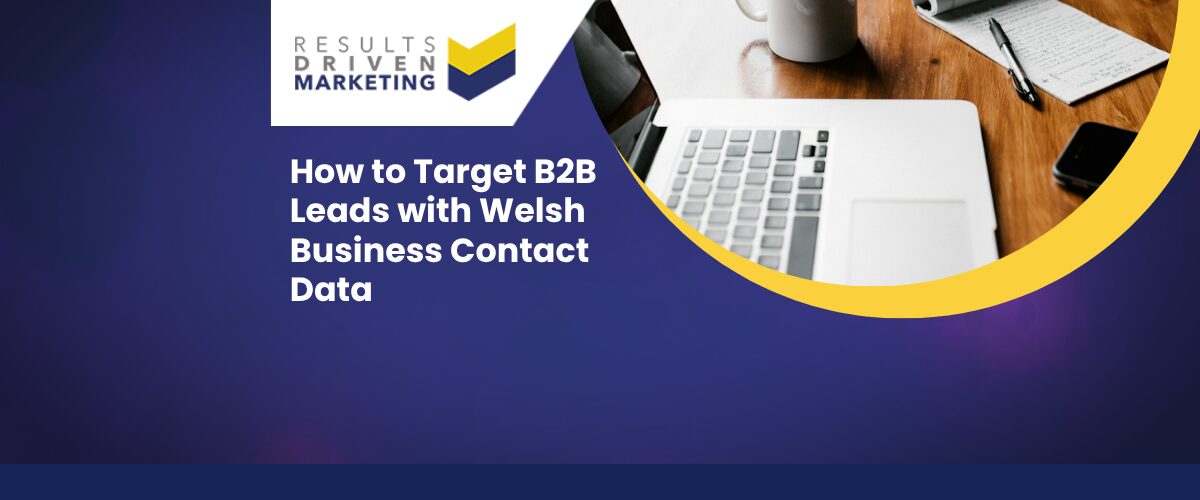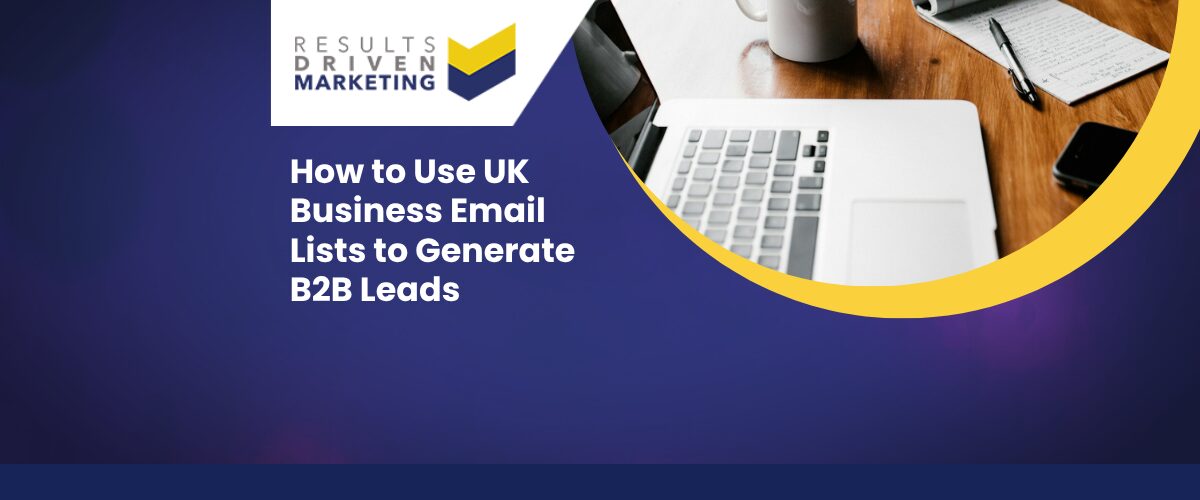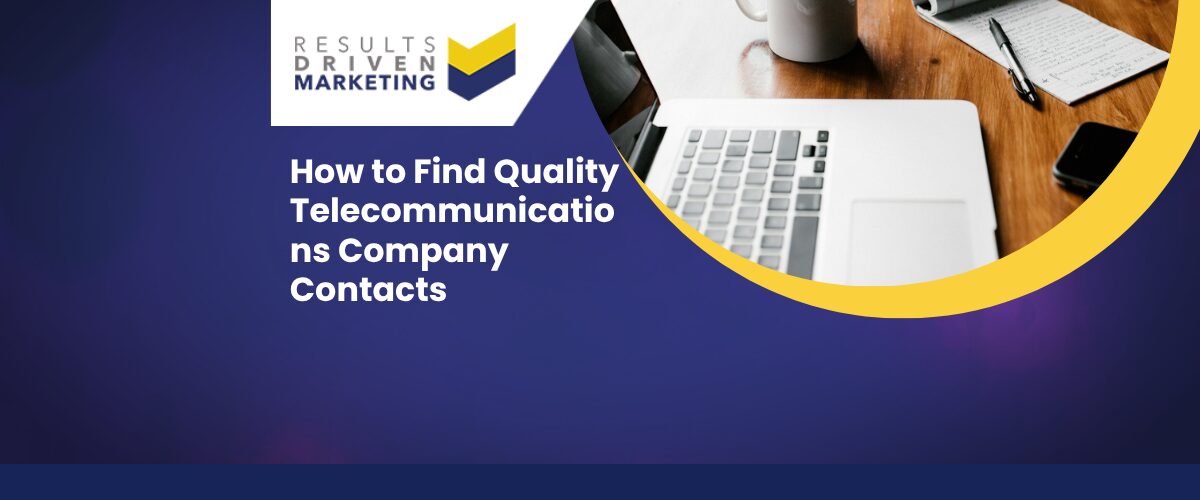
B2B Data Driven Marketing
The term “B2B data-driven marketing” has emerged as a buzzword that’s impossible to ignore. But what does it truly entail? Let’s delve into the intricacies of this marketing approach and uncover its significance in the B2B realm.
What is data-driven marketing?
At its core, data-driven marketing revolves around leveraging data to guide marketing strategies and decisions. It’s about collecting, analysing, and applying data from various sources to gain insights into customer behaviour, preferences, and trends. In the B2B context, this means understanding the needs and challenges of other businesses and crafting marketing campaigns that resonate with them.
Why is data-driven marketing important?
- Precision: With data at your fingertips, you can target your audience with pinpoint accuracy. No more shooting in the dark; every marketing move is calculated and purposeful.
- Efficiency: By understanding what works and what doesn’t, businesses can allocate resources more effectively, ensuring a higher ROI on their marketing efforts.
- Adaptability: The digital world is ever-evolving. Data-driven marketing allows businesses to adapt to changes swiftly, ensuring they’re always ahead of the curve.
The Importance of Data in B2B Marketing
In the B2B landscape, the stakes are high. Decisions aren’t made on a whim; they’re the result of careful consideration and research. This is where B2B data-driven marketing shines. By providing businesses with actionable insights, it empowers them to craft campaigns that resonate with their target audience. Whether it’s understanding industry trends, identifying potential business challenges, or uncovering areas of opportunity, data is the cornerstone of successful B2B marketing.
In essence, B2B data-driven marketing is more than just a strategy; it’s the future of B2B marketing. As data continues to play an increasingly pivotal role in shaping business decisions, those who harness its power will undoubtedly stay ahead in the game.
Benefits of Data-Driven Marketing
Diving deep into the world of marketing, one can’t help but notice the transformative power of data. Especially in the B2B sector, where decisions carry significant weight, data-driven insights can be the game-changer.
The benefits of data-driven marketing for B2B
- Informed Decisions: With a wealth of data at your disposal, every marketing move becomes calculated, reducing the chances of costly missteps.
- Enhanced Engagement: By understanding the unique needs of other businesses, B2B data-driven marketing allows for tailored campaigns that truly resonate.
- Optimised ROI: By focusing on what truly works, businesses can allocate resources more efficiently, ensuring a higher return on investment.
What are the advantages of b2b data driven marketing?
- Targeted Outreach: Say goodbye to the scattergun approach. With B2B data-driven marketing, you can reach out to the right businesses at the right time.
- Adaptive Strategies: As market dynamics shift, data-driven insights allow businesses to pivot their strategies seamlessly.
- Enhanced Credibility: When your marketing messages hit the mark consistently, it builds trust and credibility in the market.
What are the disadvantages of b2b data driven marketing?
- Over-reliance on Data: While data is powerful, an over-reliance can stifle creativity and intuition.
- Data Privacy Concerns: Handling business data comes with its set of challenges, especially concerning privacy and security.
- Potential for Misinterpretation: Data, if misinterpreted, can lead to misguided strategies.
The future of data-driven marketing
The trajectory of B2B data-driven marketing is unmistakably upward. As technology continues to evolve, the granularity of insights will only improve, making this approach indispensable for businesses.
Is a b2b data driven marketing a good idea?
Absolutely. In a world where precision matters, B2B data-driven marketing offers an edge that businesses can’t afford to ignore. It’s not just about staying relevant; it’s about leading the charge in a data-centric world.
Implementing a Data-Driven Marketing Strategy
Embarking on this journey requires a blend of strategy, technology, and foresight.
Data-driven marketing strategies
- Segmentation: Grouping businesses based on specific criteria ensures tailored messaging.
- Predictive Analysis: Anticipate market shifts and adapt before your competitors do.
- Personalisation: In the B2B space, a personal touch can make all the difference.
How to implement a data-driven marketing strategy in B2B
- Data Collection: Begin by gathering data from various touchpoints.
- Analysis: Use tools and software to derive actionable insights.
- Strategy Formulation: Based on insights, craft a bespoke marketing strategy.
- Execution: Roll out campaigns, monitor, and adjust as necessary.
How do you introduce data-driven marketing?
Introducing B2B data-driven marketing isn’t about a sudden overhaul. It’s a gradual process, starting with awareness, training, and finally, integration into the core marketing processes.
What are the key considerations when b2b data driven marketing?
- Data Quality: Ensure the data you rely on is accurate and up-to-date.
- Integration: Seamless integration of data sources is crucial for comprehensive insights.
- Ethical Considerations: Always respect data privacy and use data responsibly.
Tools and Technologies in Data-Driven Marketing
In the realm of B2B data-driven marketing, tools are the enablers, turning raw data into gold.
Data-driven marketing tools
- Analytics Platforms: Tools like Google Analytics offer a deep dive into user behaviour.
- CRM Systems: Platforms like Salesforce provide a 360-degree view of business interactions.
- Automation Tools: Tools such as HubSpot automate repetitive tasks, ensuring efficiency.
Real-world Applications and Examples
In the bustling world of B2B, it’s always beneficial to see theory put into practice. Real-world examples not only validate the effectiveness of b2b data-driven marketing but also provide a blueprint for businesses eager to embark on this journey.
Data-driven marketing examples
- Tailored Email Campaigns: A renowned B2B enterprise utilized data-driven insights to segment its audience, leading to personalised email campaigns. The result? A whopping 30% increase in engagement rates.
- Predictive Lead Scoring: Another B2B giant employed data-driven marketing to score and prioritize leads. This approach streamlined their sales process, ensuring the team focused on the most promising prospects.
- Optimised Ad Spend: By leveraging b2b data-driven marketing, a tech startup was able to allocate its ad budget more efficiently, targeting platforms that delivered the highest ROI.
The Process of Data-Driven Marketing
Peeling back the layers of b2b data-driven marketing, one discovers a structured process, each phase as crucial as the next. It’s a dance of sorts, where data takes the lead, guiding marketing strategies with precision.
The 3 phases of data-driven marketing
The beauty of b2b data-driven marketing lies in its systematic approach. It’s not about hunches; it’s about following a tried and tested process that delivers results time and again.
Data Collection
The foundation of any b2b data-driven marketing strategy, data collection is all about gathering relevant information. Whether it’s user behaviour on a website, feedback from surveys, or interactions on social media platforms, every piece of data is a puzzle piece waiting to be placed.
Steps to consider:
- Identify Sources: Determine where your valuable data will come from.
- Utilise Tools: Employ tools like Google Analytics or CRM systems to streamline the collection process.
- Ensure Consistency: Regularly update and maintain your data to ensure its relevance.
Data Analysis
Once you’ve amassed a treasure trove of data, it’s time to sift through it. Data analysis is where raw data transforms into actionable insights. It’s the phase where patterns emerge, trends are spotted, and strategies begin to take shape.
Key points:
- Segmentation: Group data based on specific criteria, be it demographic, behavioral, or transactional.
- Trend Identification: Spot emerging patterns that can guide future strategies.
- Gap Analysis: Identify areas of improvement or unexplored opportunities.
Data Execution
Armed with insights from the analysis phase, businesses can now put their b2b data-driven marketing strategies into action. It’s about making informed decisions, tailoring campaigns, and constantly iterating based on feedback.
Steps to follow:
- Craft Tailored Campaigns: Use insights to create campaigns that resonate with your target audience.
- Monitor Performance: Keep a close eye on how your campaigns are performing.
- Iterate and Optimise: Based on feedback, tweak and refine your strategies for better results.
In essence, b2b data-driven marketing is a cyclical process. It’s about collecting data, deriving insights, executing strategies, and then going back to the drawing board, armed with new data. It’s a continuous journey of learning, adapting, and growing.
The Changing Landscape of B2B Marketing
The B2B arena is no stranger to evolution. With the rapid advancements in technology and the ever-shifting market dynamics, the landscape of B2B marketing is undergoing a transformation, one that’s hard to overlook. At the heart of this change? You guessed it – b2b data-driven marketing.
Behaviour and habits in B2B marketing
Gone are the days when B2B marketing was all about cold calls and generic pitches. Today, it’s a whole new ball game. The behaviour and habits of businesses have evolved, and here’s how:
- Informed Decisions: Businesses are no longer making decisions in the dark. With a plethora of data at their fingertips, they’re making choices that are informed and strategic.
- Personalised Outreach: The one-size-fits-all approach is passé. B2B marketing today is all about personalizstion, understanding the unique needs of businesses, and tailoring campaigns accordingly.
- Emphasis on Relationships: It’s not just about making a sale; it’s about building lasting relationships. B2B marketing now places a strong emphasis on nurturing relationships and ensuring long-term engagement.
B2B data-driven marketing is objectively changing the way companies make their decisions
The influence of b2b data-driven marketing on decision-making cannot be overstated. It’s not just a tool; it’s a guiding force. Here’s how it’s reshaping the decision-making process:
- Data at the Forefront: Decisions are no longer based on gut feelings. Data is the guiding light, offering insights and clarity.
- Predictive Analysis: Companies can now anticipate market shifts and customer needs, allowing them to stay ahead of the curve.
- Efficiency and Precision: With b2b data-driven marketing, resources are allocated more efficiently, ensuring that efforts are directed where they matter the most.
Alternatives and Comparisons
While b2b data-driven marketing is undoubtedly a force to be reckoned with, it’s essential to understand the broader picture and explore alternatives.
What are the alternatives to b2b data driven marketing?
- Traditional Marketing: This approach relies on tried and tested methods like print advertising, telemarketing, and trade shows. While it may lack the precision of data-driven methods, it still holds value in certain contexts.
- Intuition-based Marketing: Some businesses swear by the power of intuition and experience. While it may not offer the granularity of data-driven insights, it brings a human touch to decision-making.
- Competitor Analysis: Instead of relying solely on data, some companies prefer to keep a close eye on their competitors, basing their strategies on market trends and competitor moves.
In conclusion, while b2b data-driven marketing is a game-changer, it’s essential to have a holistic view of the marketing landscape. By understanding the alternatives, businesses can craft strategies that are not only data-driven but also well-rounded and comprehensive.
FAQ
Ah, the frequently asked questions. A section where curiosity meets clarity. Let’s address some of the burning questions surrounding b2b data-driven marketing, shall we?
What is B2B data-driven marketing?
B2B data-driven marketing, in its essence, is all about leveraging data to guide and inform marketing strategies within the business-to-business realm. It’s not just about collecting numbers; it’s about deriving meaningful insights from these numbers. Think of it as a compass in the vast sea of B2B marketing, guiding businesses towards informed decisions and more effective campaigns.
Why is data-driven marketing essential for B2B?
Well, there are a plethora of reasons, but let’s touch upon the most pivotal ones:
- Precision: In the B2B world, precision is key. Data-driven marketing allows businesses to target their audience with laser-like accuracy, ensuring that messages resonate.
- Efficiency: Time is money, especially in B2B. By understanding what works and what doesn’t, resources can be allocated more effectively, ensuring a higher ROI.
- Adaptability: The B2B landscape is ever-evolving. Data-driven insights allow businesses to adapt swiftly, ensuring they’re always a step ahead.
How does data-driven marketing impact the target audience?
The impact is profound. With b2b data-driven marketing, the target audience receives content that’s tailored to their needs and preferences. It’s not about bombarding them with generic messages; it’s about engaging them with relevant and meaningful content. This not only enhances the user experience but also fosters trust and loyalty.
How does B2B data-driven marketing differ from traditional marketing methods?
Ah, the age-old debate. While traditional marketing methods rely heavily on intuition and broad-based strategies, b2b data-driven marketing is all about specificity. Here’s a quick comparison:
- Data vs. Intuition: Traditional methods often rely on gut feelings and past experiences. In contrast, data-driven marketing is all about leveraging concrete data to inform decisions.
- Relevance vs. Reach: Traditional marketing often aims for a wide reach, casting a broad net. B2B data-driven marketing, on the other hand, focuses on relevance, ensuring that messages resonate with the target audience.
- Adaptability: While traditional methods can be somewhat rigid, data-driven marketing is fluid, allowing businesses to adapt their strategies based on real-time insights.
In a nutshell, while both approaches have their merits, b2b data-driven marketing offers a level of precision and adaptability that’s hard to match.
Who are we?
Providing b2b database solutions is our passion.
Offering a consultancy service prior to purchase, our advisors always aim to supply a database that meets your specific marketing needs, exactly.
We also supply email marketing solutions with our email marketing platform.
We have the best data of email lists for your networking solutions as well as direct mailing lists & telemarketing lists
A good quality b2b database is the heartbeat of any direct marketing campaign…
It makes sense to ensure you have access to the best!
Call us today on 0191 406 6399 to discuss your specific needs.





